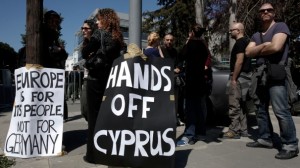 Zero lawmakers voted in favor of the bill, and 36 voted against it.
Zero lawmakers voted in favor of the bill, and 36 voted against it.
Earlier Tuesday, The government amended its initial proposal to shield small savers from the plan, which aims to raise euro5.8 billion ($7.5 billion) in return for euro10 billion ($12.9 billion) from other eurozone countries and the International Monetary Fund. The total bailout money would go to prop up the country’s banks and public finances.
But even the modification, which will allow those with up to euro20,000 ($25,858) in the bank to escape the confiscation, opposition to the bill remained strong. Four parties and an independent deputy, accounting for 34 of the total 56 seats in Parliament have all said they recommend voting against the bill. The bill needs 29 votes to pass.
With the bill is rejected, Cyprus’ international bailout is now endangered, raising the very real possibility that Cypriot banks could collapse, and the country could face bankruptcy and may even have to leave Europe’s single currency.
Officials have said a “Plan B” should be sought in case the bill is rejected.
Under the amendment, people with between euro20,000 and euro100,000 in the bank would pay a tax of 6.75 percent on their deposits, and those with higher amounts would pay euro9.9 percent. In the initial proposal agreed on in Brussels late Friday, there would have been no exemptions for those with small amounts in the bank.
The plan has been met with fury in Cyprus and has sent jitters across financial markets.
In a heated debate, lawmakers spoke of “raw blackmail” from Europe in forcing Cyprus into the deal, while hundreds of protesters gathered outside Parliament chanting anti-government slogans.
Banks on the island nation will stay shut until Thursday in an effort to prevent a bank run.
In a sign of the scale of disagreement over the deposit charge, the country’s central bank governor, Panicos Demetriades, recommended that no accounts below euro100,000 be touched. That level represents the amount of savings that are supposed to be insured if a bank collapses.
“The credibility of, and trust in the banking sector depends on this,” said Demetriades, who conceded that he expects at least 10 percent of deposits to be withdrawn when the banks eventually re-open.
Failure to pass the bill could mean no bailout money from the eurozone and IMF and lead to Cyprus’s bankruptcy, which could reignite concerns in financial markets over the single currency’s future. That would likely put deposits in the country’s banks under even more threat.
Although Cyprus is the smallest eurozone country to be bailed out, the details of the plan sent shockwaves through the single currency area as it was the first time savers’ banks accounts have been directly targeted. Other bailed out countries such as Greece, Ireland and Portugal have raised funds by imposing new taxes.
Proponents of the deposit seizure argue that this way gets foreigners who have taken advantage of Cyprus’s low-tax regime to share the cost of the bailout of the banks, which have been hit hard by their over-exposure to bad Greek debt.
About a third of all deposits in Cypriot banks are believed to be held by Russians.
Finance Minister Michalis Sarris was flying to Moscow Tuesday afternoon to meet with his Russian counterpart.
Andreas Charalambous, a senior official at the ministry, said the aim is to extend repayment of a euro2.5 billion loan Russia granted Cyprus in late 2011 when the country could no longer borrow from international markets.
He said Cyprus was also looking for “potential interest for further investment in the country.”
Opponents say a blanket charge on people’s bank accounts will hurt ordinary Cypriots more, and could shake the confidence of all in the country’s banking sector. And by going after deposits, European policymakers have set a precedent that could be repeated in the future. The worry of bank runs across Europe lies at the heart of market concerns.
Charalambous said Cypriot authorities believe depositors should be protected, but that a wholesale exemption for those below euro100,000 would mean a “disproportionate” burden on large savers, and a “very detrimental” knock-on effect on economic growth.
“Because of the size of the estimated (bailout) needs, the burden on those above euro100,000 would be such that it would again impact small people because it would destroy the ability of the country to attract foreign investment,” Charalambous said.
In a Monday night teleconference, eurozone finance ministers concluded that small depositors should not be hit as hard as others. They said Cyprus should stagger the seizures more, but insisted that the overall take should stay the same.
President Nicos Anastasiades, who was elected less than a month ago, told German Chancellor Angela Merkel Monday night that “the possibility of reducing the requirements from self-raised funds is being explored,” a Cypriot government spokesman said.
The two leaders were expected to speak again on Tuesday, he added.
Christine Lagarde, the head of the International Monetary Fund which is participating in Cyprus’s bailout, said in Frankfurt that the IMF was “extremely supportive of the Cypriot authorities’ intentions to introduce more progressive rates in the one-off tax.”
Published March 19, 2013 / Associated Press

Leave a Reply